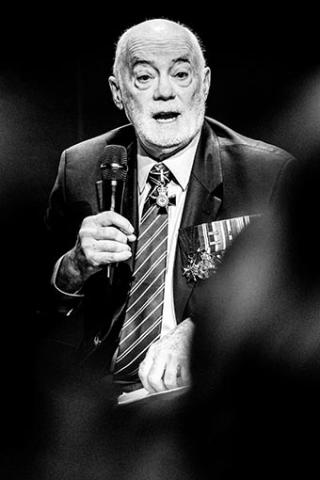
Joined
1971
Postings
- Chief of Operations Land Force Command: 1990-1993
- Deputy Chief of Staff, Acting Army Commander: 2003-2004
- Commander of the Canadian Army: 2005-2006
Operational experience
- Cyprus – 1974
- Oka Crisis (Canada) – 1990
- Kosovo - 1998
For the Canadian Airborne Regiment arriving on their first peacekeeping mission, the outlook was encouraging. “The operational theatre was quiet,” recalls then-Platoon Commander Marc Caron. Then, on July 15th, everything changed.
Lieutenant-General (Retired) Marc Caron grew up with a deep understanding of the Canadian Armed Forces and what it means to serve – his father had served in the Second World War, Korea, and Cyprus and was a proud member of the Royal 22nd Regiment. So when he enlisted he was well aware of the challenges and responsibilities that awaited him. This path led to a 35-year career, marked by important missions and positions of great responsibility. In 1974, Caron deployed to Cyprus.
Cyprus has long been a strategic crossroads of the Mediterranean. The island’s history led to a division between the Greek Cypriots and the Turkish Cypriots, and conflict ensued. By 1964, the United Nations stepped in with a peacekeeping mission, creating a buffer zone that would separate the two sides. Known as the Green Line, this division continues to stretch across Cyprus.
“People believed that it was a quiet place and we were on our way to success there.”
Prior to Caron’s arrival, the United Nations Forces in Cyprus had reduced its presence on the island. “When we got there,” says Caron, “the Canadian contingent over time had gone through a drawdown from 1,100 to 700 to 450 where we were. All an indication that people believed that it was a quiet place and we were on our way to success there.”

Canadian Peacekeepers enjoying some down time with a softball match.
For Caron and his platoon, the sense of calm offered an opportunity to establish their footing. But that changed on 15 July 1974 when an attempted coup by Greek nationalists led to a Turkish invasion five days later. Caron and his unit suddenly found themselves in the midst of heated conflict, witnessing a significant amount of small arms, mortar and artillery fire between the two sides. Through this the Canadians were required to protect civilians and work to keep order along the Green Line.
During the invasion, the contingent faced a critical situation at the Ledra Palace, a grand hotel located on the Green Line. At the time, 386 tourists were staying at the hotel, including Canadians and the spouses of some Canadian service members. When the Greek Cypriot National Guard set up firing positions inside, threatening the safety of civilians, the UN Forces evacuated the tourists and occupied the hotel, transforming it into a UN Protected Area. “We reassured them,” says Caron. “We got them out.” Their actions averted a potential disaster and saved many lives.
Nicosia International Airport was another crucial strategic point during the conflict as it was used to move troops in and out of the country.
The Canadians were tasked with securing the airport, but most of their forces were engaged elsewhere in the country. This meant the Canadians had to use logistics personnel, including mechanics and cooks, as infantry troops to create the illusion of a larger force protecting the airport.
“If Canada wasn’t there in those strategic historical events of 1974, we would have had a completely different story in Cyprus.”
The 1974 mission to Cyprus left a lasting mark on Caron and his comrades. The experience showed that even in peacekeeping operations, intensive military preparation is crucial. The actions of Canadians not only helped to stabilize the region but also contributed to saving lives. In Caron’s modest words, what happened in 1974, “wasn’t necessarily spectacular because it was a success.” But upon reflection, he notes, “if Canada wasn’t there in those strategic historical events of 1974, we would have had a completely different story in Cyprus.”

Platoon Commander Marc Caron (far left, wearing a beret) in Cyprus with the Canadian Airborne Regiment near the Ledra Palace Hotel in 1974.
Caron’s experience in Cyprus is a testament to courage, dedication and the ability of the Canadian Forces to deal with extraordinary situations with professionalism and humanity. “Those stories are long gone now,” he says. But, 60 years on, Canada’s legacy in Cyprus endures. In 2024, as we commemorate the 60th anniversary of Canada’s contributions to the UN Force in Cyprus, we remember its lasting and significant impact, preserving peace and saving lives in the most precarious of times.
Video: Marc Caron
Marc Caron